Related Research Articles

Émile Édouard Charles Antoine Zola was a French novelist, journalist, playwright, the best-known practitioner of the literary school of naturalism, and an important contributor to the development of theatrical naturalism. He was a major figure in the political liberalization of France and in the exoneration of the falsely accused and convicted army officer Alfred Dreyfus, which is encapsulated in his renowned newspaper opinion headlined J'Accuse…! Zola was nominated for the first and second Nobel prizes in literature in 1901 and 1902.

'La Curée is the 2nd novel in Émile Zola's 20-volume series Les Rougon-Macquart serialised from 1871 to 1872 and published in book form in 1872. It deals with property speculation and the lives of the extremely wealthy Nouveau riche of the Second French Empire, against the backdrop of Baron Haussmann's reconstruction of Paris in the 1850s and 1860s.
Naturalism is a literary movement beginning in the late nineteenth century, similar to literary realism in its rejection of Romanticism, but distinct in its embrace of determinism, detachment, scientific objectivism, and social commentary. Literary naturalism emphasizes observation and the scientific method in the fictional portrayal of reality. Naturalism includes detachment, in which the author maintains an impersonal tone and disinterested point of view; determinism, which is defined as the opposite of free will, in which a character's fate has been decided, even predetermined, by impersonal forces of nature beyond human control; and a sense that the universe itself is indifferent to human life. The novel would be an experiment where the author could discover and analyze the forces, or scientific laws, that influenced behavior, and these included emotion, heredity, and environment. The movement largely traces to the theories of French author Émile Zola.

Au Bonheur des Dames is the eleventh novel in the Rougon-Macquart series by Émile Zola. It was first serialized in the periodical Gil Blas from December 17, 1882 to March 1, 1883; and published in novel form by Charpentier in 1883.

Les Rougon-Macquart is the collective title given to a cycle of twenty novels by French writer Émile Zola. Subtitled Histoire naturelle et sociale d'une famille sous le Second Empire, it follows the lives of the members of the two titular branches of a fictional family living during the Second French Empire (1852–1870) and is one of the most prominent works of the French naturalism literary movement.
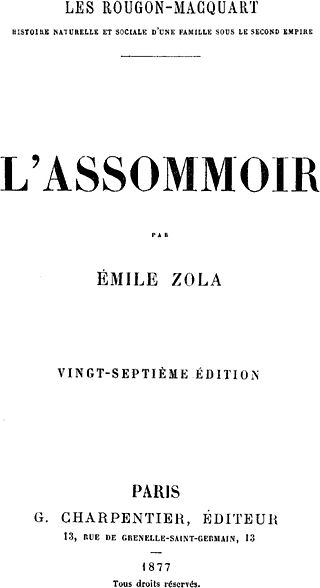
L'Assommoir, published as a serial in 1876, and in book form in 1877, is the seventh novel in Émile Zola's twenty-volume series Les Rougon-Macquart. Usually considered one of Zola's masterpieces, the novel — a study of alcoholism and poverty in the working-class districts of Paris — was a huge commercial success and helped establish Zola's fame and reputation throughout France and the world.

Nana is a novel by the French naturalist author Émile Zola. Completed in 1880, Nana is the ninth installment in the 20-volume Les Rougon-Macquart series.

19th-century French literature concerns the developments in French literature during a dynamic period in French history that saw the rise of Democracy and the fitful end of Monarchy and Empire. The period covered spans the following political regimes: Napoleon Bonaparte's Consulate (1799–1804) and Empire (1804–1814), the Restoration under Louis XVIII and Charles X (1814–1830), the July Monarchy under Louis Philippe d'Orléans (1830–1848), the Second Republic (1848–1852), the Second Empire under Napoleon III (1852–1871), and the first decades of the Third Republic (1871–1940).
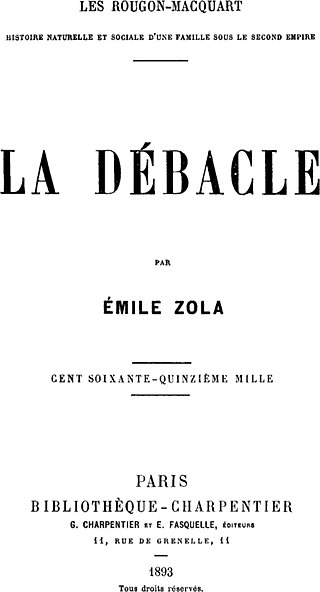
La Débâcle (1892), translated as The Debacle and The Downfall, is the penultimate novel of Émile Zola's Les Rougon-Macquart series, which first appeared as a serial in La Vie populaire from 21 February to 21 July 1892, before being published in book form by Charpentier.
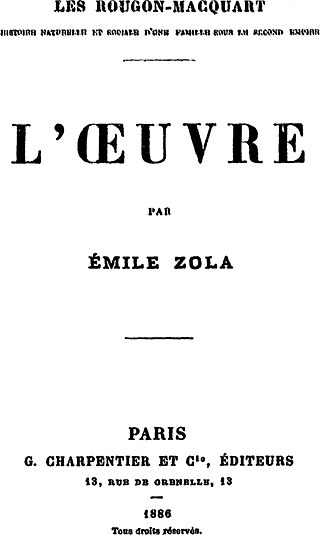
'L'Œuvre(The Masterpiece)' is the fourteenth novel in the Rougon-Macquart series by Émile Zola. It was first serialized in the periodical Gil Blas beginning in December 1885 before being published in novel form by Charpentier in 1886.

Épinal prints were prints on popular subjects rendered in bright, sharp colors, sold in France in the 19th century. They owe their name to the fact that the first publisher of such images, Jean-Charles Pellerin, who was born in Épinal, named the printing house he founded in 1796 Imagerie d'Épinal.
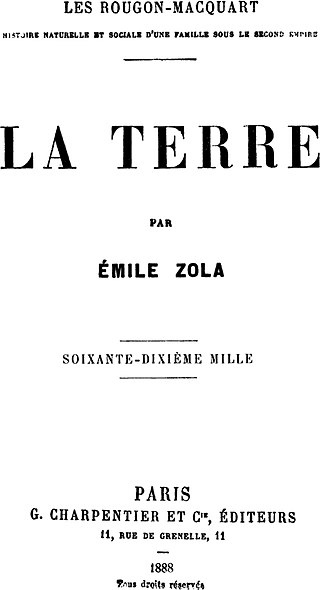
La Terre is a novel by Émile Zola, published in 1887. It is the fifteenth novel in Zola's Rougon-Macquart series. The action takes place in a rural community in the Beauce, an area in central France west of Paris. The novel is connected to others in the series by the protagonist, Jean Macquart, whose childhood in the south of France was recounted in La Fortune des Rougon, and who goes on to feature prominently in the later novel La Débâcle.
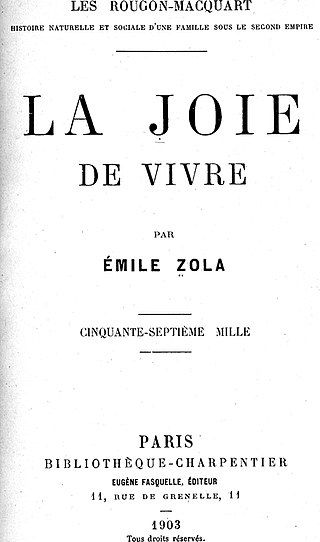
La joie de vivre is the twelfth novel in the Rougon-Macquart series by Émile Zola. It was serialized in the periodical Gil Blas in 1883 before being published in book form by Charpentier in February 1884.
Literary realism is a literary genre, part of the broader realism in arts, that attempts to represent subject-matter truthfully, avoiding speculative fiction and supernatural elements. It originated with the realist art movement that began with mid-nineteenth-century French literature (Stendhal) and Russian literature. Literary realism attempts to represent familiar things as they are. Realist authors chose to depict every day and banal activities and experiences.
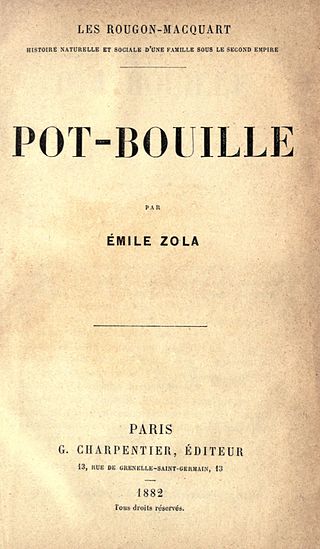
Pot-Bouille is the tenth novel in the Rougon-Macquart series by Émile Zola. It was serialized between January and April 1882 in the periodical Le Gaulois before being published in book form by Charpentier in 1883.
Le Docteur Pascal is the twentieth and final novel of the Rougon-Macquart series by Émile Zola, first published in June 1893 by Charpentier.

Germinal is a 1993 French-Belgian epic film based on the 1885 novel by Émile Zola. It was directed by Claude Berri, and stars Gérard Depardieu, Miou-Miou and Renaud. At the time it was the most expensive movie ever produced in France. It was the fourth most attended film of the year in France.
Brian Nelson is a professor emeritus of French Studies at Monash University, Melbourne.
John Andrew Frey was an American philologist.

Rita Schober was a German scholar of Romance studies and literature.
References
- ↑ "Thompson, Hannah". Virtual International Authority File.
- ↑ "School's Pupils Win Places at Oxbridge". Newcastle Evening Chronicle. 20 September 1991.
- ↑ "Congregation of the Regent House on 15 November 1997". Cambridge University Reporter. 19 November 1997. Retrieved 4 August 2020.
- ↑ "Congregation of the Regent House on 24 March 2001". Cambridge University Reporter. 25 April 2001. Retrieved 4 August 2020.
- ↑ "Fellows of the Colleges: Darwin College". Cambridge University Reporter. 5 October 2000. Retrieved 4 August 2020.
- ↑ "DLLC Home-Research-Profile-Researchers-Professor Hannah Thompson". Royal Holloway University of London. 2020. Retrieved 2 August 2020.
- ↑ Capitanio, Sarah (2006). "Naturalism Redressed: Identity and Clothing in the Novels of Emile Zola (Review)". French Studies. 60 (4): 529–30. doi:10.1093/fs/knl139. S2CID 162300185 – via Project Muse.
- ↑ Duffy, Larry (2006). "Naturalism Redressed: Identity and Clothing in Emile Zola's Rougon-Macquart (Review)". The Modern Language Review. Modern Languages Review. 101 (4). Modern Humanities Research Association: 1132–1133. doi:10.2307/20467090. JSTOR 20467090.
- ↑ Martin-Berg, Laurey (March 2007). "Reviewed work:Naturalism Redressed: Identity and Clothing in Emile Zola's Rougon-Macquart". The French Review. 80 (4). American Association of teachers of French: 918–919. JSTOR 25480826.
- 1 2 Humphreys, Karen (July 2015). "Taboo: Corporeal Secrets in Nineteenth-Century France". French Studies. 69 (3): 403–404. doi:10.1093/fs/knv134.
- ↑ "Taboo: Corporeal Secrets in Nineteenth-Century France". Forum for Modern Language Studies (Review). 50 (4): 510. October 2014. doi:10.1093/fmls/cqu060.
- ↑ Grauby, Francoise (July 2014). "Taboo: Corporeal Secrets in Nineteenth-Century France". The Modern Language Review. 109 (3). Modern Languages Research Association: 809–10. doi:10.5699/modelangrevi.109.3.0809. JSTOR 10.5699/modelangrevi.109.3.0809.
- ↑ Berberi, Tammy (2016). "Taboo: Corporeal Secrets in Nineteenth-Century France". Disability & Society. 31 (3). Routledge: 431–2. doi: 10.1080/09687599.2016.1141570 . S2CID 147357792.
- 1 2 Rose, Sherri (2018). "Rose on Thompson (2017)". Nineteenth-Century French Studies, 47.1-2. Retrieved 2 August 2020.
- 1 2 Thompson, Hannah; Warne, Vanessa (2018). "Blindness Arts". Disability Studies Quarterly 38.3. Retrieved 28 July 2020.
- ↑ Thompson, Hannah J. (22 February 2019). "Oscars: audio description brings film to life for blind people, it deserves an award too". The Conversation. Retrieved 28 July 2020.
- ↑ Thompson, Hannah (2004). Naturalism Redressed: Identity and Clothing in the Novels of Emile Zola. European Humanities Research Centre. ISBN 978-1-900755-82-5.
- ↑ Thompson, Hannah (5 July 2017). Taboo: Corporeal Secrets in Nineteenth-century France. Routledge. ISBN 978-1-351-54720-8.
- ↑ Thompson, Hannah (18 August 2017). Reviewing Blindness in French Fiction, 1789–2013. Springer. ISBN 978-1-137-43511-8.
- ↑ "Canadian Journal of Disability Studies 8.6 Foreword". Canadian Journal of Disability Studies. 8 (6): 1–5. 19 December 2019. doi:10.15353/cjds.v8i6.576.